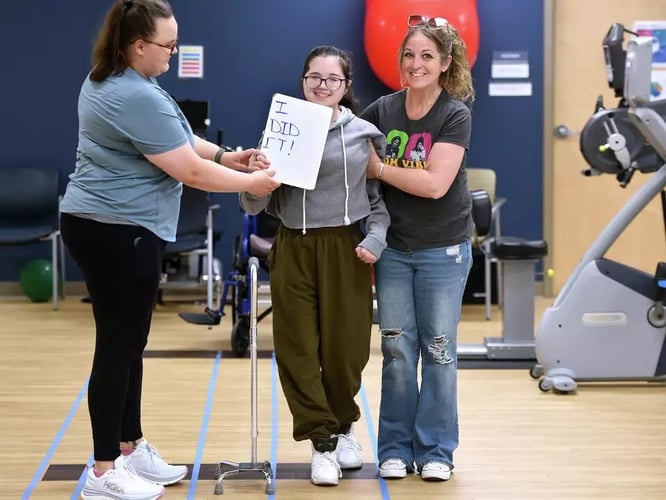 "When I was in the hospital, I heard a lot about all the things I’d probably never be able to do again," says 18-year-old Bella Chambasis. She kept going anyway
"When I was in the hospital, I heard a lot about all the things I’d probably never be able to do again," says 18-year-old Bella Chambasis. She kept going anyway
A roar of applause and cheers echoed through Connecticut’s East Haven High School’s football stadium last week as 18-year-old Bella Chambasis slowly made her way across the mid-field stage — flanked by her mom and a school staff member — to receive her diploma.
“I heard everyone screaming at first,” recalls Chambasis. “But then I stopped hearing anything because I was so focused on getting across the stage and making it to the other side.”
For most teenagers, graduating from high school is a rite of passage that marks one of their first steps into adulthood.
For Chambasis — who has endured more hardship and loss than most of us face in a lifetime — those eight steps she took across the stage at her ceremony on Thursday, June 12, were the culmination of years’ worth of hard work and the fulfillment of a vow she made shortly after emerging from a coma in 2021.
“I didn’t just want to be remembered as ‘the girl in the wheelchair,’ ” says the 18-year-old honors student when asked why it was so important for her to receive her diploma while standing on her own two feet. “I wanted everyone there to remember me as ‘Bella, the girl who overcame kidney failure and survived.' ”
The story behind Chambasis' moment of triumph is a dark one, tracing back to April 2009. That's when the family’s babysitter murdered her big sister, Arianna, who was 7.
“It was a very horrific time for us, something none of us will ever get over,” says Deann Hurley, Chambasis’ mom.
Life slowly returned to normal during the next decade. But in January 2021, Hurley watched as her usually spunky youngest daughter began experiencing nose bleeds and prolonged bouts of lethargy.
An urgent care doctor told Chambasis to put Vaseline in her nose, then sent her on her home. But two days after that, she could barely stand up and began having difficulty breathing.
Chambasis was intubated to help her breathe and, because she was so anemic, had more than a dozen blood transfusions.
An initially promising recovery masked a looming problem: Two months later, just as Chambasis was preparing to leave the hospital, she suffered a serious stroke and spent the next month in a coma.
“They began having quality of life conversations with me, explaining how they could stop her dialysis and just let her renal functions shut down,” Hurley says. “All I could think was, ‘I’m not going to lose two daughters in the month of April.’ ”
Instead, she kept a constant vigil by Chambasis’ hospital bed, playing Bruno Mars and Keyshia Cole tunes for her nonstop.
Asked about her memories from that period, Chambasis says, simply: “I’ve always loved music and have always learned lyrics to songs really fast. And when I like a song, I always sing it no matter what.”
During this period, the joy of realizing she’d survived was soon tempered by questions of what her life was going to look like in the future.
“When I finally did come back, I kept asking myself, ‘Why is all this happening to me?’ ” Chambasis says.
Related posts


